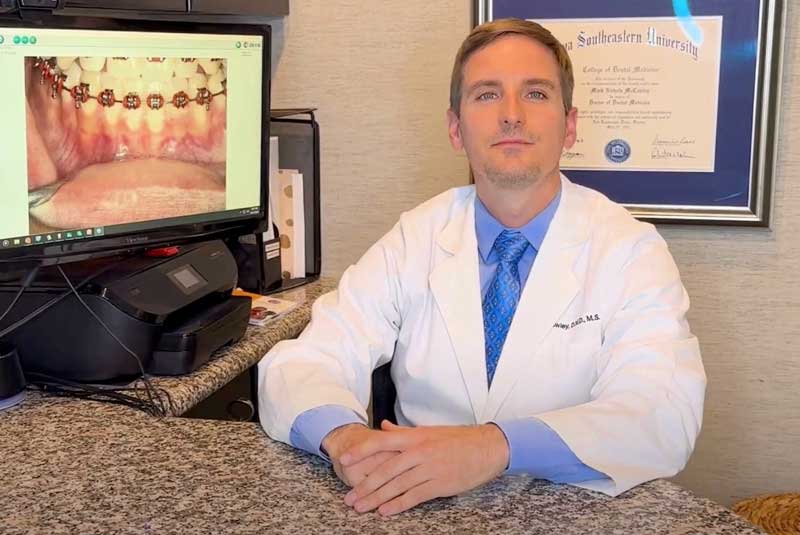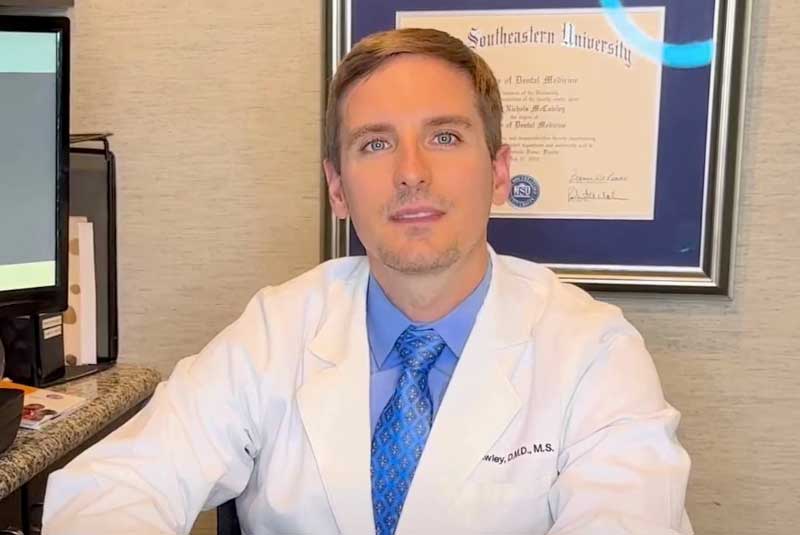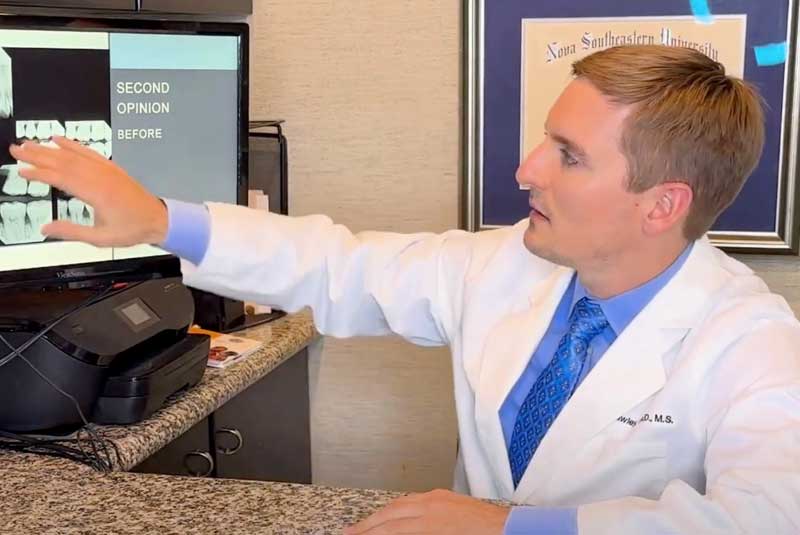| ✅ Reviewed by Dr. Tom McCawley | 🕒 Reading time: four minutes |
Wisdom teeth tend to show up when you least expect them — often during late teens or early adulthood — and can cause a surprising number of problems. While some people never need them removed, others deal with pain, crowding, or damage to surrounding teeth.
At McCawley Center for Laser Periodontics & Implants, we help patients make informed decisions based on what’s happening below the surface. This guide breaks down when wisdom teeth are safe to keep, when they should come out, and what can happen if you ignore early signs of trouble.
What Are Wisdom Teeth?
Wisdom teeth are your third set of molars, located at the very back of your mouth. They usually emerge between the ages of 17 and 25, a time when you’re considered “wiser” — hence the name.
These teeth were once useful for our ancestors, whose diets consisted of coarse roots, nuts, and raw meats. Today, with softer foods and better dental care, wisdom teeth are more likely to become problematic than helpful.
In many cases, the jaw simply doesn’t have the space to accommodate these extra molars. This lack of room can cause them to erupt at odd angles, get stuck beneath the gum line, or press against nearby teeth.
Some people are even born without them entirely, while others may have one, two, or all four. Regular dental X-rays can help track their development and catch potential issues early.
Watch this video to see an X-ray of a wisdom tooth that caused damage and decay in the tooth next to it:
When Wisdom Teeth Don’t Cause Problems
Not every wisdom tooth is a ticking time bomb. In fact, some erupt just fine and work alongside your other molars. If your wisdom teeth:
- Come in straight
- Are fully erupted
- Do not crowd your other teeth
- Can be cleaned easily
…then removal may not be necessary.
“If they’re coming in normally, you can chew with them, and you can keep them clean, then there’s really no reason to get your wisdom teeth out.” —Dr. Mark McCawley
When Wisdom Teeth Should Be Removed
Unfortunately, this scenario isn’t common. Wisdom teeth are notorious for:
- Growing in crooked or sideways
- Partially erupting through the gums
- Getting trapped beneath the gum line (impaction)
- Causing cavities in themselves or adjacent teeth
- Triggering gum inflammation or infection
“I saw a patient where a wisdom tooth had grown into the molar in front of it and caused damage. There was also a cavity on the wisdom tooth. That’s a situation where we’d recommend removal.” — Dr. McCawley
Problems like these often worsen with time. Even if you’re not in pain now, delayed removal can result in:
- Permanent damage to nearby teeth
- Bone loss around the impacted tooth
- Cyst or tumor development
- Oral infections
Signs You Might Need Wisdom Teeth Removed
You may need a periodontal evaluation if you notice:
- Swelling or pain in the back of your mouth
- Bad breath or an unpleasant taste that doesn’t go away
- Jaw stiffness or difficulty opening your mouth
- Gum tenderness or bleeding around rear molars
- Crowding or shifting of your other teeth
What Happens If You Keep Them Too Long?
Wisdom teeth can remain hidden or dormant for years and then suddenly cause problems. Even if you’re symptom-free now, impacted wisdom teeth may develop issues silently. We’ve seen cases where the damage wasn’t obvious until decay had already spread to healthy teeth.
Our Wisdom Tooth Evaluation Process
We use advanced imaging and diagnostic tools to assess your wisdom teeth. We will never recommend removal unless it’s clearly beneficial. If we do recommend it, we coordinate with trusted oral surgeons or handle the referral process for you.
The Bottom Line
The key is prevention. Don’t wait until there’s pain. Get a clear, expert evaluation so you can make the best decision for your oral health.
“If you can keep them clean and there are no issues, you can keep your wisdom teeth. Otherwise, it’s a good idea to get them removed.” — Dr. McCawley
Book a Consultation in Fort Lauderdale, FL
If you have questions about your wisdom teeth or want a professional opinion before deciding on treatment, we’re here to help. Our team offers thorough evaluations, advanced imaging, and clear recommendations so you can make informed choices about your care. If removal is needed, we will connect you with a trusted oral surgeon and coordinate your next steps.
Learn More About The Services We Offer
To book an appointment at our periodontal office in Fort Lauderdale, FL, call (954) 807-4829 or visit us at 800 East Broward Blvd #706 Fort Lauderdale, FL.
FAQs About Wisdom Tooth Removal
It depends on how many teeth are removed and whether they are impacted. A single wisdom tooth extraction can take about 20–40 minutes. If you are having all four removed, the entire appointment typically lasts 60–90 minutes, including preparation and recovery time before you go home.
Most patients feel better within 3–7 days. You may have some swelling, mild discomfort, and stiffness in the jaw for the first few days. Full healing of the gums and bone can take a few weeks. Following your aftercare instructions will help you recover faster.
The cost varies based on how many teeth need to be removed, whether they are impacted, and the type of anesthesia used. In Florida, simple extractions often range from $200–$400 per tooth, while impacted wisdom teeth typically cost $400–$800 each. Your total cost can be higher or lower depending on factors such as the complexity of your case (for example, if the tooth is close to a nerve, infected, or requires bone removal), whether IV or general anesthesia is used, the provider’s experience, and your exact location within Florida. Dental insurance often helps cover part of the procedure if removal is medically necessary.











